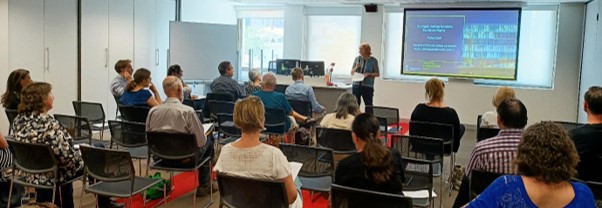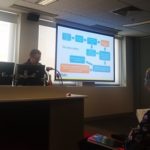
On February 11th, the Southgate Institute hosted a policy club on the topic of the impacts of chronic stress on mental health, and the implications for policy. Dr. Leila Morsy, Dr. Jane Fitzgerald, and Dr. Matt Fisher presented on different aspects of chronic stress, and discussed what the potential policy responses could be.
Dr. Leila Morsy presented the findings on racial and socioeconomic inequities in exposure to stressors during childhood, and the health and educational outcomes of that heightened exposure. One of her suggested responses was health-justice partnerships to address the causes of the exposure to stressors, such as violence, and housing problems.
 Dr. Jane Fitzgerald, a recent Southgate Institute PhD graduate, presented on the influence of our urban built environments on mental health, and the positive effects of the natural environment on mental health, but noted that most policy was focused only on mental illness.
Dr. Jane Fitzgerald, a recent Southgate Institute PhD graduate, presented on the influence of our urban built environments on mental health, and the positive effects of the natural environment on mental health, but noted that most policy was focused only on mental illness.
 Dr. Matt Fisher presented a theory of public wellbeing that could serve as a basis for policy that focused more on the social determinants of mental health, and took a more collective, rather than individual, approach to mental health.
Dr. Matt Fisher presented a theory of public wellbeing that could serve as a basis for policy that focused more on the social determinants of mental health, and took a more collective, rather than individual, approach to mental health.
 Brendan Kelly, Principal Project Officer for Strategy and Planning for Mental Health and Wellbeing, at Wellbeing SA, acted as respondent, reflecting on the presentations and considering their relationship with Wellbeing SA initiatives.
Brendan Kelly, Principal Project Officer for Strategy and Planning for Mental Health and Wellbeing, at Wellbeing SA, acted as respondent, reflecting on the presentations and considering their relationship with Wellbeing SA initiatives.
A recording of the livestream of the event can be viewed at: https://video.flinders.edu.au/events20/20/SouthgatePolicyClub.cfm and tweets from the night can be found by searching for #FlindersSouthgate and #Stress

